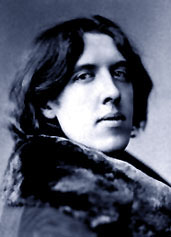| |
 The
Importance of Being Earnest, by Oscar Wilde. The
Importance of Being Earnest, by Oscar Wilde.
Old Fire Station until 26th August
The Dionysis Theatre Company offered us here a graphic illustration
of the perils of performing two wildly contrasting works in repertory.
One got the impression that their performance of Middleton's dark,
charged tragedy The Changeling, with which they opened their
summer season, must have been extremely involved and emotional. Too
emotional, in fact, for the cast seemed unable to shake off their
self-inflicted gloom sufficiently by the next evening to perform Wilde's
Importance of being Earnest with the light-hearted relish it
deserves.
The Importance of Being Earnest is justifiably one of the best loved
of English comedies. One of Wilde's last works, it suggests that he
was beginning to realise which qualities in his writing were most
appreciated by the public. The moralising which dilutes the humour
of works such as The Picture of Dorian Gray, and An Ideal
Husband is entirely discarded, leaving a play as flippant as it
is farcical, full to bursting with the wit for which Wilde was justly
famous.
But whle it is undeniably one of the masterpieces of the English stage,
it does require at least some basic rules to be observed for it to
work satisfactorily. Of crucial importance, for example, is costume.
Wilde's characters are nothing if not elegant. Indeed, the superficiality
of society is one observation the play-wright seems determined to
make, albeit with a characteristic refusal to condemn the trait. It
is, however, difficult to appreciate the sententiousness, or even
the accuracy, of this comment when faced with the motly collection
of ill-fitting frock-coats and battered boots with which the Dionysis
Theatre Company arrays itself.
Moreover, to be successful, true farce requires considerable skill
in characterisation and dramatic pacing. Wilde does his part, creating
first a set of thoroughly ridiculous yet appealingly larger-than-life
characters, then a plot which winds itself into knots with wonderful
capricousness, and then glossing the whole thing over with some of
the wittiest lines in English theatre. Unfortunately Dionysis rather
let him down. Their characterisation was for the most part disappointingly
weak, two notable exceptions being Delphine Schrank as a wet yet scheming
Cecily, and Philip Stane as a charmingly doddery Dr Chasuble. The
all-important witticisms were tripped over and occasionally thrown
away, and at times the tension of the piece was entirely ruined by
inappropriate blocking: the effect of the catty tea-time exchange
between Gwendoline and Cecily, for example, relies on their sitting
side by side, covering their emotions throughout, rather than springing
away from each other as they did.
It would be wrong to conclude that this production is entirely unenjoyable.
There were moments of genuinely skilful comic acting; and Wilde's
writing is such that one can not help but warm to many of the funny
lines in this charming play. But on the whole one was left feeling
that the company could have done with an injection of energy and sparkle.
Hopefully they will give themselves one by the end of the run - or
perhaps even a dose of something stronger to help them get over their
Middleton.
Matthew Rogers, 10 / 8 / 00
|